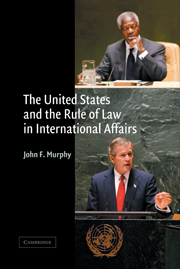Book contents
- Frontmatter
- Contents
- Acknowledgments
- Introduction
- 1 Law and legal process in international affairs
- 2 The status of international law under US law
- 3 UN dues
- 4 Use of force
- 5 Arms control, disarmament, nonproliferation, and safeguards
- 6 The law of the sea
- 7 The International Court of Justice
- 8 Prevention, prosecution, and punishment of international crimes
- 9 Human rights and international environmental issues
- 10 Summary and conclusions, and some possible future scenarios
- Index
9 - Human rights and international environmental issues
Published online by Cambridge University Press: 22 September 2009
- Frontmatter
- Contents
- Acknowledgments
- Introduction
- 1 Law and legal process in international affairs
- 2 The status of international law under US law
- 3 UN dues
- 4 Use of force
- 5 Arms control, disarmament, nonproliferation, and safeguards
- 6 The law of the sea
- 7 The International Court of Justice
- 8 Prevention, prosecution, and punishment of international crimes
- 9 Human rights and international environmental issues
- 10 Summary and conclusions, and some possible future scenarios
- Index
Summary
In various places in this study we have had occasion to consider human rights issues arising out of US actions and the reaction thereto. In chapter 8, for example, we noted a number of human rights issues arising out of US efforts to obtain custody of alleged perpetrators of international crimes, and a major part of the criticism of the US plan to use military commissions to try detainees at Guantánamo Bay in Cuba is based on the perception that the commissions will not afford the due process rights to defendants required by international human rights law or by the law of armed conflict. In chapter 2 we examined the Senate's use of federalism clauses, declarations of non-self-executing status, and reservations to provisions inconsistent with state law as part of the process of giving its consent to US ratification of human rights treaties. The result of this process has been that the human rights treaties to which the United States is a party have had no significant impact on US law, contrary to one of the primary goals of such treaties, which is to change and improve the domestic law of states parties.
The focus in this chapter is somewhat different. It is to explore some of the difficulties the United States has had in its dealings with international institutions which have responsibility to promote and ensure respect for human rights, especially the United Nations.
- Type
- Chapter
- Information
- The United States and the Rule of Law in International Affairs , pp. 325 - 348Publisher: Cambridge University PressPrint publication year: 2004



